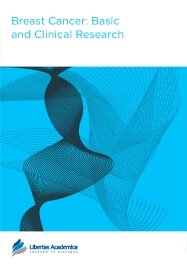

Publication Date: 13 Jan 2011
Type: Review
Journal: Breast Cancer: Basic and Clinical Research
doi: 10.4137/BCBCR.S5331

Breast Cancer is the most prevalent cancer in the world with 4.4 million survivors up to 5 years following the diagnosis.1 In the US alone approximately forty thousand women die annually of metastatic breast cancer (MBC). Despite many effective systemic treatment options approximately 50% of women with MBC succumb to the disease within 24 months of the diagnosis.2 Ixabepilone is a novel, first in class member of the epothilone class of antineoplastic agents. Ixabepilone is indicated as monotherapy for the treatment of metastatic or locally advanced breast cancer in patients whose tumors are resistant or refractory to anthracyclines, taxanes, and Capecitabine. Ixabepilone is also indicated in combination with Capecitabine for the treatment of patients with metastatic or locally advanced breast cancer resistant to treatment with an anthracycline and a taxane, or whose cancer is taxane resistant and for whom further anthracycline therapy is contraindicated. Ixabepilone was extensively studied as a single agent in patients with MBC and was found to be effective and well tolerated with a predictable and manageable safety profile. Not surprisingly prior exposure to anthracyclines and taxanes affects significantly the potential for response to therapy with single agent Ixabepilone in metastatic setting. MBC patients with taxane resistant MBC have objective response rate (RR) of 12%, patients with prior low exposure to taxanes and/or resistance RR = 22%, Ixabepilone treatment after adjuvant anthracycline therapy exposure renders RR = 42% and in Taxane naïve patients RR = 57%. In two large phase III studies of Ixabepilone + Capecitabine versus Capecitabine alone, progression free survival (PFS) and overall response rates (RR) were higher in the combination treatment arms, but no survival advantage was seen overall. Treatment with Ixabepilone + Capecitabine in a phase II study resulted in an overall response rate (ORR) of 23% in ER/PR/HER2 negative, triple-negative breast cancer patients (TNBC) while ORR of 31% was seen in a preplanned pooled analysis of TNBC in the phase III trials of Ixabepilone + Capecitabine. Significantly prolonged median PFS was seen for TNBC treated with the combination of Ixabepilone + Capecitabine compared to Capecitabine alone 4.2 vs. 1.7 months respectively. Ixabepilone as single agent appears to show excellent antitumor activity in patients with TNBC MBC. Addition of Ixabepilone to Capecitabine results in approximately doubling in median PFS for TNBC versus Capecitabine alone. Single agent Ixabepilone is generally well tolerated, and its toxicity profile does not overlap with that of Capecitabine and therefore depending on prior exposure to chemotherapy both single agent Ixabepilone or in combination with Capecitabine can be used safely and effectively for treatment of advanced breast cancer.
PDF (539.89 KB PDF FORMAT)
RIS citation (ENDNOTE, REFERENCE MANAGER, PROCITE, REFWORKS)
BibTex citation (BIBDESK, LATEX)
XML
PMC HTML

The submission process for manuscript publication in Breast Cancer: Basic and Clinical Research is as easy as A,B,C! Any minor hiccups I encountered were quickly addressed by Libertas' expert staff via prompt emails, and the timelines between initial submission and publication are surely the shortest on record! I will definitely be submitting future manuscripts to this journal, and look forward to working with their professional and expert team.

All authors are surveyed after their articles are published. Authors are asked to rate their experience in a variety of areas, and their responses help us to monitor our performance. Presented here are their responses in some key areas. No 'poor' or 'very poor' responses were received; these are represented in the 'other' category.See Our Results
Copyright © 2013 Libertas Academica Ltd (except open access articles and accompanying metadata and supplementary files.)
FacebookGoogle+Twitter
PinterestTumblrYouTube